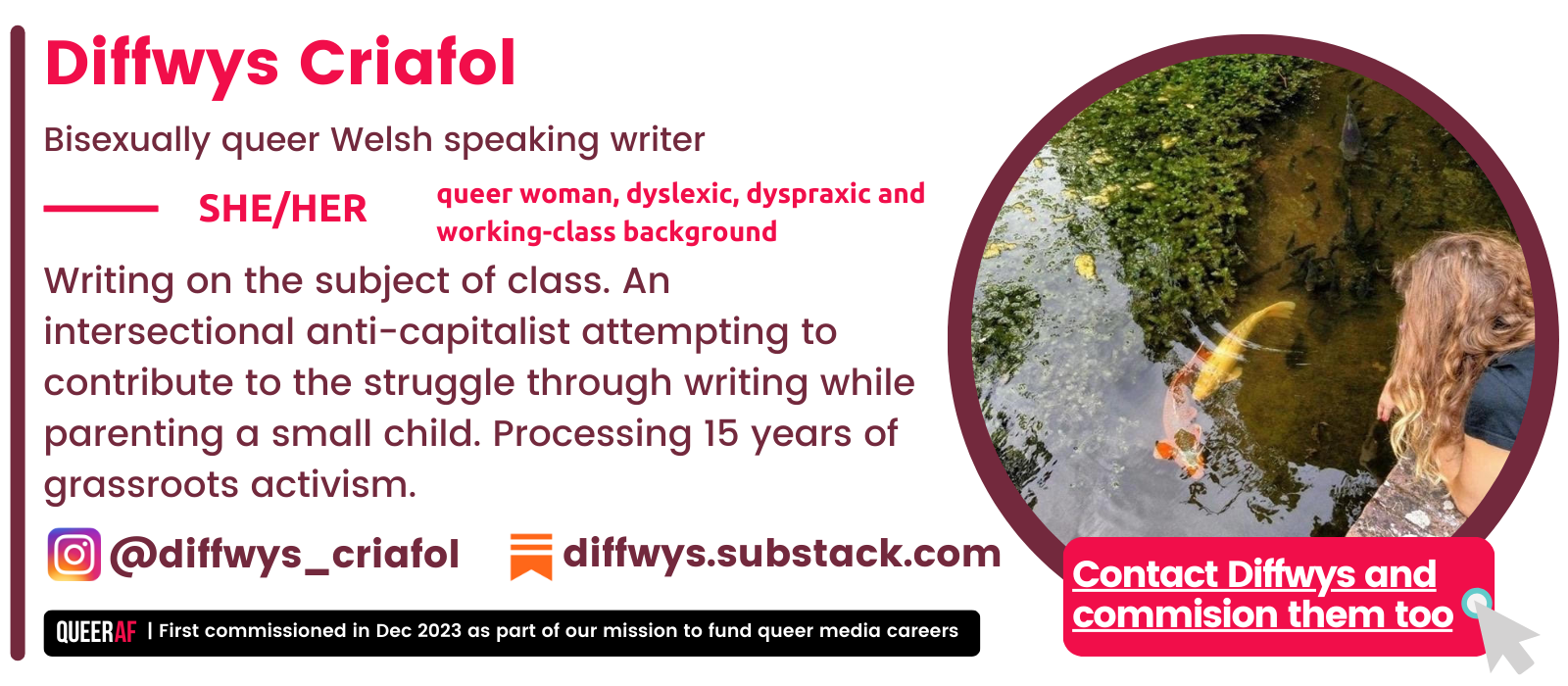
Wales. The land of song, of poetry and also – a queer revolution.
Most people wouldn't think that this country of sheep and shut down coal mines would be the place for an exciting and dynamic queer cultural scene, but it’s happening.
During the last few years, the decades of work by our queer elders has come to fruition in the form of a blossoming queer cultural and literary scene. Cultivated by activists, the queer community is more accessible and inclusive than ever before.
I grew up in Gwynedd, a predominantly rural county where the majority of people speak Welsh.
I was constantly teased for being a “lesbian” at school. The bullies must have had great gaydar. They knew of my queerness even before I did! But I wasn’t alone. I witnessed others being bullied and even attacked for their perceived queerness too.
“Gay” was the most shameful slur you could call someone. I was persistently concerned that I might be queer - the idea really frightened me at that age.
The homophobia in these communities continued for many years after school. I heard from a friend that some people chose the ‘Woman interested in women’ option on dating apps to look for evidence about who was ‘gay’ in their village, in order to gossip and vilify.
Despite this there has been an undeniable shift in recent years.
“Paid ag anghofio fod dy galon yn y chwyldro. / Don't forget that your heart is in the revolution.”
- GWENNO, from the song Chwyldro
In my youth all there was for us rural Welsh queers was one gay bar, in a city over an hour away by bus. We tried to get in with fake IDs, but the place overwhelmingly seemed like it was just for white, able bodied gay men anyway. Exploring queerness felt totally dependent on alcohol and quite inaccessible to me as a young person.
Fast forward to today and, in Gwynedd alone, there are several LGBTQIA+ youth clubs, a queer reading group, and projects at Ty Newydd, a historic building hosting residential writing courses, to support queer writers.
On the national level, the Urdd, a Welsh language youth organisation (which boasts 55,000 members), has a dedicated youth queer space at their yearly Eisteddfod. Their mascot Mr Urdd, now a queer ally, proudly wears a He/Him (Fo/Fe) pronoun badge.
The main event of Welsh language culture, the national Eisteddfod where our poets are crowned and throned in the bardic tradition, has developed an LGBTQIA+ initiative called “Mas ar y Maes”. There is also a Queer Welsh language mobile bookshop - Paned o Ge.
However, these initiatives have often faced serious backlash. There is a lot more work to do before we can be fully accepted by Welsh society.
Some Queer youth still feel that they must move to the big cities in order to be themselves. The Welsh language is losing speakers. The heartlands, where Welsh is a community language, are suffering from their youth leaving for the cities. As such, the fates of the Welsh language and Welsh queerness have become inextricably linked.
When the first-ever anthology of Queer Welsh language poetry - Curiadau - was published this year, it felt like a corollary to this struggle. It was a historic moment, where the periphery moved towards the centre.
I hope that all of these initiatives make growing up queer or trans in rural Wales easier. It’s particularly heartening how many of them are led by the community, for the community.
I know for sure that if I had more access to these resources growing up, it would have given me a way to quiet down the internalised homophobia I took on from the bullies at school, and find spaces to be me. The growth of queer life in rural Wales shows me that the place I love is somewhere I can be myself - we don’t all have to flee to the apparent safety of the big cities to be queer.
I recognise there’s still a long way to go, but I’m so glad we can also appreciate what the queer community in Wales have achieved.
This article is part of a QueerAF and Inclusive Journalism Cymru partnership dedicated to uplifting Welsh LGBTQIA+ emerging and marginalised journalists.

Get the Queer Gaze in your inbox each week with our free weekly newsletter or pitch to write an edition for us now.
QueerAF has partnered with Inclusive Journalism Cymru.
Together we're running a dedicated series of think pieces as part of a unique set of Queer Gaze commissions - our landmark writing scheme.
The articles are being written by three LGBTQIA+ journalists from Inclusive Journalism Cymru's network.
The Queer Gaze is a space in the QueerAF newsletter to commission emerging and underrepresented queer creatives to get published, receive mentorship, and kickstart your career.
Each commission comes with a unique 'retrospective' sub-editing session designed to put you in control of your article.
It's helping Welsh LGBTQIA+ creatives build journalistic craft and strategic communication skills.
You can support our work by becoming a QueerAF member.










